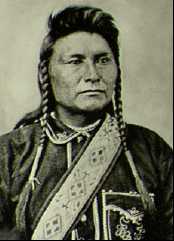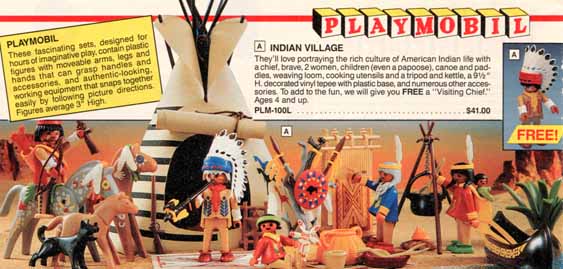 A compilation of the responses to TIME magazine's false and misleading series on Indian gaming
A compilation of the responses to TIME magazine's false and misleading series on Indian gaming A compilation of the responses to TIME magazine's false and misleading series on Indian gaming
A compilation of the responses to TIME magazine's false and misleading series on Indian gaming
TIME mag: Gaming "given" to some tribes, not others
TIME mag: Greedy tribes disenroll legitimate members
TIME mag: Non-Natives bankroll "instant reservations"
TIME mag: "Aid" to wealthy tribes robs poor tribes
and some of the screeds arising from it:
Safire: Gaming rife with fraud, corruption, intimidation
Foster's: Native casino gambling exploits Natives
Letter from the National Indian Gaming Association to Time Magazine
December 10, 2002
Time Magazine
Time and Life Building
Rockefeller Center
New York, NY 10020-1393
Dear Editor:
On behalf of the 184 Tribes of the National Indian Gaming Association, I would like to express my disgust with your December 16, 2002 special report, "Indian Casinos: Wheel of Misfortune." The story begins with the word "imagine…" That is the appropriate beginning for a story twisted to the point of a fairy tale. Your reporters use isolated circumstances to write what amounts to a gossip column.
Your story is based on the false and offensive premise that "Washington" created Indian gaming as a "cheap way to wean tribes from government handouts." Indian gaming is not a federal program. Instead, it is a one tool that Tribes use to generate revenue for their communities. The Federal programs that you refer to handouts represent an attempt by the federal government to live up to thousands of treaty obligations incurred when establishing the land base for this Nation. American Indians have been victimized by federal policies supporting genocide and assimilation, which took millions of lives and millions of acres of Indian land, and caused economic and cultural destruction. Our grandfathers, Pontiac, Tecumseh, Crazy Horse, Chief Joseph, Geronimo, and so many others, fought for our rights – especially our right to self government on our own land. The U.S. Constitution, the President, Congress, and the United States Supreme Court all recognize Indian Tribes as governments.
Indian gaming is self-reliance. Through Indian gaming, Tribes have created over 300,000 jobs nationwide. Jobs in Indian Country are precious -- whether its 80 jobs on the Pine Ridge reservation, located in the poorest county in the United States, or 3,000 jobs at the Oneida Nation of New York, outside Syracuse. Yet your report completely discounts the value of jobs to our people who have historically suffered shocking unemployment rates, high levels of poverty and lack of economic opportunities on Indian homelands.

More than 200 of the roughly 340 Indian Tribes in the lower 48 states use Indian gaming to generate tribal government revenue. That is about 60% of Indian Tribes. So yes, Indian gaming is broadly benefiting Indian Country. Naturally, Indian Tribes that are closer to large markets are generating revenue. Is that a surprise in a market economy? If you are advocating "to each according to his need and from each according to his ability," Russia tried that and failed. On the same note, we can hardly believe that an organization led by Ted Turner can, without blushing, publish stories suggesting that others should not pursue economic ventures in America.
Indian Tribes use gaming first and foremost for tribal government programs, community infrastructure, charity, and aid to local governments. Where Indian Tribes have suffered the highest teen suicide rates in the country, Indian gaming has built schools, funded colleges scholarships, and given our children hope for a brighter future. The Mille Lacs Band of Ojibwe, for example, built two schools and their high school graduates are now fluent in both Ojibwe and English. Where our people suffer epidemic problems of diabetes, heart, and liver disease, Indian gaming is building health clinics, dialysis centers, and fitness centers.
Indian gaming not only works for Indian Country, it works for America. Contrary to your story, Tribes are not running roughshod over our neighboring communities. Non-Indians hold 75% of the 300,000 jobs Indian gaming has created nationwide. Tribes have brought economic development to historically rural and undeveloped areas. It's a fact that many Indian casinos are the largest employers in their areas. In addition, Tribes have numerous service agreements with state and local governments to share revenues, contribute emergency service equipment, build roads and other infrastructure, and provide other government services to non-Indian community members. For example, the Mohegan Tribe's restaurants serve buffalo meat purchased from Plains Indian Tribes while the Agua Caliente Band of Cahuilla Indians purchased fire trucks for Palm Springs. The Forest County Potawatomi Tribe funds Milwaukee Indian School and aids the Red Cliff and Mole Lake Bands of Chippewa. Additionally, Tribes donate $68 million annually to charitable organizations.
American Indians are American taxpayers. Indian gaming revenue is 100% taxed – the vast majority goes directly for tribal government purposes serving as tribal tax revenue, and any remainder that is paid to tribal members is subject to Federal income taxation. In fact, through employee income, payroll, vendor taxes, and revenue sharing agreements, Indian gaming generates over $4 billion in annual revenue for the Federal Government, over $1 billion for the states, and $50 million for local governments. American Indians pay another $4 billion in personal Federal income taxes.
That the NIGC has yet to discover any major cases of corruption is a testament to the upstanding job done by our regulatory personnel. Your article continues to perpetuate a myth that Indian gaming is not regulated. This is simply not true. President Bush has just appointed a former U.S. Attorney, former FBI agent, and former state deputy attorney general to staff the National Indian Gaming Commission. In addition to the $164 million that Indian Tribes dedicate to tribal government regulation and the $40 plus million that tribal governments pay to states for state regulation, the NIGC has an $8 million budget. In total, that's over $212 million that Indian Tribes spend annually on regulation. This figure includes the employment of over 2,800 gaming commissioners and regulatory staff. In addition, Tribes work with the FBI within the Department of Justice, FinCEN and the IRS within Treasury, and the BIA within the Interior Department. Your suggestion that this regulatory system is less than comprehensive is just plain wrong – as a number of DOJ investigations have found.

Furthermore, your discussion of management contracts is faulty at best. Whether a Tribe chooses to employ a management company or developer is an exercise of a Tribe's individual sovereignty. Each Tribe has the right to choose what is most beneficial for its own membership and community. Whether or not a Tribe chooses a management firm is a tribal decision and the fact remains that Tribes are legal entities with the right to determine their own future as they see fit within the context of the law. Many Tribes have never had a management agreement and have operated their gaming enterprises pursuant to their own gaming ordinances, long before the Indian Gaming Regulatory Act was passed.
In conclusion, as American Indians, we find it highly offensive that TIME published an article belittling tribal self-government and the very positive attempts of tribal governments to dispossession for hundreds of years. You do not belittle Israeli or Palestinian efforts toward self-determination, but it can not fathom that within the United States, Indian Tribes continue to be vital, self-governing nations working to build a life for our people.
Ernie Stevens, Jr.
Chairman
National Indian Gaming Association
Magazine distorts tribal casinos
Imagine this news headline: "Dirty Dealing: U.S. corporations are making millions for investors and providing little to the poor."
How would the business world react?
Aren't U.S. corporations expected to make money for their investors? Isn't that expected in a capitalistic society? And while businesses create jobs, do we expect them to solve this country's poverty problems?
So imagine much of Indian Country's reaction to Time Magazine's Dec. 16 cover story and this Internet headline: "Dirty Dealing: Indian Casinos are making millions for their investors and providing little to the poor."
The story is part of Time's "Indian Casinos: Wheel of Misfortune" series expect Part II in the Dec. 22 issue. The articles attempt to explore the New Money infiltrating infant tribal economies. Guess what? Tribal casinos have made a few tribes — and a few non-Native investors — swimmingly rich. What's more? This country still has "poor Indians."
This isn't new news.

The writers, two Pulitzer-winning investigative journalists, have had better days. Their series is mostly rehashed information, much of it already told by tribes themselves.
And while there are casino success stories, few tribal governments expect the handful of casino-rich ones to solve Indian Country's woeful economic disparity, a situation created by this country's historically unjust treaty, land management and taxation policies.
The Cabazon Band of Mission Indians in California turned to gambling two decades ago to bring money to their reservation. The U.S. Supreme Court approved the tribe's bingo enterprises in 1987, the year before Congress enacted the Indian Gaming Regulatory act in 1988.
So the act didn't create tribal gambling, but it did create the National Indian Gaming Commission, charged with regulating tribal gambling operations. The act also defined tribal gambling's purpose; a means to provide tribes with economic development, community infrastructure, charity and aid to local governments.
Time Magazine describes the law as Washington's "cheap way to wean tribes from government handouts."
Thus, Time's writers set the tone for stories that read more like editorials, a throwback to the magazine's early days as an opinion journal. The stories highlight extreme gambling examples. This flawed framework doesn't accurately reflect the tremendous impact casino profits have had on tribes not located near metro market areas — such as those in Montana, North Dakota, Wisconsin, Idaho, Nebraska and South Dakota. So far, the magazine has devoted only a four-paragraph story to positive gains from gambling.
Either way, Time would have readers believe gambling is a corrupt industry, even though the National Indian Gaming Commission has yet to discover any major cases of corruption, nor, yet, have the magazine's highly touted investigative journalists.
While the magazine damages the credibility of gambling in Indian Country, it reinforces the warped image this country has of tribal governments. Instead of viewing each sovereign nation independently, Time conveniently paints as a single enemy some 250 federally recognized tribes with casinos.
It seems tribes — distinct political and legal entities — are one and the same to the outside observer.
Case in point:

"In 2000 alone, tribes spent $9.5 million on Washington lobbying," according to Time. "Altogether they spend more to influence legislation than such longtime heavyweights as General Motors, Boeing, AT&T or even Enron in its heyday."
First, tribes didn't pool $9.5 million then collectively decide a political strategy. These independent nations hire lobbyists and pursue their own agendas for anything from health to roads to education to teen suicide prevention.
Nebraska tribes' alleged use of political influence and lobbying efforts will be featured in Time's second part of the series, according to the magazine's public relations department.
The U.S. Constitution acknowledges that tribes have the same status as that of a state or foreign nation. It paved the way for this country to negotiate 600 treaties with tribes, legal documents that helped foster fraud and deceit of aboriginal lands.
There's not a piece of real estate in this country that Native people did not own before it was stolen. For what little land base tribes have left, the U.S. Interior Department is in charge of managing those resources, too.
Any federal assistance tribes receive today hardly compares to the aid given to states, counties, cities or farmers. Tribal governments have a long way to go before they achieve the stable economies they knew before their land bases were dismantled.
If Native lands were kept whole, Native people today might be in charge of farm food production. Then they could stand in line for a big government handout:a share in the $182 billion farm aid package. Now there's a six-year deal.
Who needs weaning?
Meanwhile, gambling is certainly not tribes' means to an end. But it is making an incredible economic difference in some Native communities, improving living standards in some of the poorest counties in America. By Time accounts, some tribes have done too well.
"The amount of money involved is staggering," according to the magazine. "Last year 290 Indian casinos in 28 states pulled in at least $12.7 billion in revenue. Of that sum, Time estimates, the casinos kept more than $5 billion as profit. That would place overall Indian gaming among Fortune magazine's 20 most profitable U.S. corporations, with earnings exceeding those of J.P. Morgan Chase & Co., Merrill Lynch, American Express and Lehman Bros. Holdings combined."

Once again, tribal sovereign nations are viewed as one.
A more appropriate assessment would be an industry-to-industry comparison, to match the tribal casino industry to, let's say, the U.S. coal, oil or financial investment industries. Then, tribes' estimated $5 billion industry profit pales compared with the near $40 billion profit reaped by the U.S. oil industry.
Indian Country has waged too many battles, for too many decades, for too many centuries.
Poor health care and impoverished living conditions give this country's shortest life spans to Native men and Native infants. And Native resources and assets remain in jeopardy.
The Interior Department manages 56 million acres for tribes and individuals, including their most valuable resources, coal, oil and timber. Yet today, the department can't account for an estimated $100 billion belonging to individual landowners.
Now there's a "dirty dealing" story for Time.
Reach Jodi Rave Lee at 473-7240 or jrave@journalstar.com.
More responses to TIME's attack on Indian gaming
ICT: TIME Marches on Indian Country (part one of a series)
CNIGA: TIME Misses the Point of Tribal Government Gaming
NCAI: Letter from the National Congress of American Indians
ICT: Gaming Leaders Denounce Magazine Slant
ICT: Secret of Indian Casinos: Everyone Wins
ICT: TIME Has Slanted View of Indian Country
NIGA: Letter to William Safire
Dealing with Hypocrisy: Time Magazine‘s Double Standard Defames American Indians and Indian Tribes
Native American Times: Shameful Report Distorts Tribal Gaming
AGA position statement re: TIME Magazine articles
ICT: TIME Keeps Strafing Indian Country
Dorreen Yellow Bird: Don't Go Betting the House on a Tribal-Gaming Series
Arizona Republic: It's a Tribal Gamble, Win or Lose; 'Time' Probe of Casino Gaming Ignores Positives
ICT: For Time Magazine, Sovereignty 101 (part two of a series)
ICT: For Time Magazine, Diné Rejection of Casinos a Cultural Choice
ICT: The Fear of Successful Indians
ICT: NPR's Fresh Air Gets Stale
Harold A. Monteau: That Wasn't Reporting; That Was Vandalism; Response to Time Magazine's Series on Indian Gaming
TIME's Lies Threaten Indian Agenda
ICT: A History of Critics Getting Our Story Wrong
Related links
The facts about Indian gaming
Journalists and Indians: the clash of cultures
The essential facts about Indians today
|
. . . |

|
All material © copyright its original owners, except where noted.
Original text and pictures © copyright 2007 by Robert Schmidt.
Copyrighted material is posted under the Fair Use provision of the Copyright Act,
which allows copying for nonprofit educational uses including criticism and commentary.
Comments sent to the publisher become the property of Blue Corn Comics
and may be used in other postings without permission.